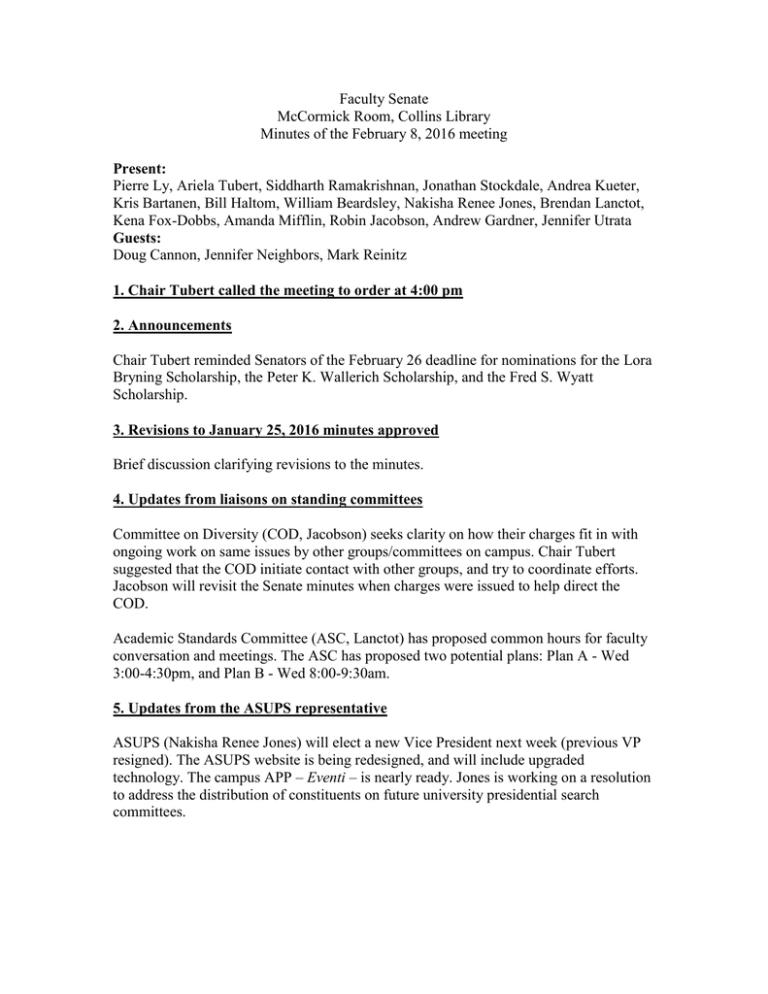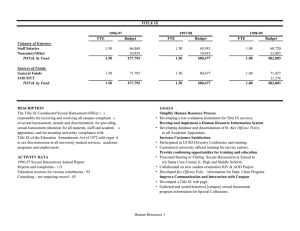
Faculty Senate
McCormick Room, Collins Library
Minutes of the February 8, 2016 meeting
Present:
Pierre Ly, Ariela Tubert, Siddharth Ramakrishnan, Jonathan Stockdale, Andrea Kueter,
Kris Bartanen, Bill Haltom, William Beardsley, Nakisha Renee Jones, Brendan Lanctot,
Kena Fox-Dobbs, Amanda Mifflin, Robin Jacobson, Andrew Gardner, Jennifer Utrata
Guests:
Doug Cannon, Jennifer Neighbors, Mark Reinitz
1. Chair Tubert called the meeting to order at 4:00 pm
2. Announcements
Chair Tubert reminded Senators of the February 26 deadline for nominations for the Lora
Bryning Scholarship, the Peter K. Wallerich Scholarship, and the Fred S. Wyatt
Scholarship.
3. Revisions to January 25, 2016 minutes approved
Brief discussion clarifying revisions to the minutes.
4. Updates from liaisons on standing committees
Committee on Diversity (COD, Jacobson) seeks clarity on how their charges fit in with
ongoing work on same issues by other groups/committees on campus. Chair Tubert
suggested that the COD initiate contact with other groups, and try to coordinate efforts.
Jacobson will revisit the Senate minutes when charges were issued to help direct the
COD.
Academic Standards Committee (ASC, Lanctot) has proposed common hours for faculty
conversation and meetings. The ASC has proposed two potential plans: Plan A - Wed
3:00-4:30pm, and Plan B - Wed 8:00-9:30am.
5. Updates from the ASUPS representative
ASUPS (Nakisha Renee Jones) will elect a new Vice President next week (previous VP
resigned). The ASUPS website is being redesigned, and will include upgraded
technology. The campus APP – Eventi – is nearly ready. Jones is working on a resolution
to address the distribution of constituents on future university presidential search
committees.
6. Discussion of the Professional Standards Committee’s proposal for changes to the
Campus Policy Prohibiting Harassment and Sexual Misconduct
Jennifer Neighbors and Mark Reinitz represented the Professional Standards Committee
(PSC), and presented their proposal (see Appendix) for changes to the Campus Policy
Prohibiting Harassment and Sexual Misconduct, to fall after Part II Section E and to
replace the second paragraph of the current Part II Section E. The subsequent discussion
focused on the specific language of the proposal, and several senators suggested that
there be additional consideration of the text in the second paragraph, specifically focusing
on clarity regarding “romantic” relationships. .
M/S/P the Senate endorses the change to the Campus Policy Prohibiting Harassment and
Sexual Misconduct proposed by the PSC.
7. Meeting adjourned at 5:18pm.
Minutes prepared by Kena Fox-Dobbs.
Respectfully submitted,
Pierre Ly, Secretary of the Faculty Senate
Attachments:
Appendix: Professional Standards Committee’s proposal for changes to the Campus
Policy Prohibiting Harassment and Sexual Misconduct
PSC proposal for a new section for the Campus Policy Prohibiting Harassment and Sexual
Misconduct, to fall after Part II Section E and to replace the second paragraph of the current
Part II Section E:
Relationships Between Faculty and Students
The pedagogical relationship between faculty and students is one that entrusts the faculty
member with guiding and shaping a student's academic and oftentimes personal development.
Power inequalities between faculty members and students are inherent in such a situation. For
example, faculty members have the power to make or influence decisions that may affect a
student's education, financial aid, graduate school opportunities, current and future
employment, and overall ability to succeed in his or her time at college.
As a result, the ability for a student to give full and affirmative consent to a sexual and/or
romantic relationship with a faculty member can be diminished or compromised. In addition to
the potential harm such relationships can inflict on the student, such relationships have the
potential to create a negative environment for other individuals who may perceive that they
are disadvantaged as a result of the relationship. Consequently, the University of Puget Sound
prohibits any sexual and/or romantic relationship between a faculty member and a student. All
reported violations of this policy will be investigated. If it is determined that a violation has
occurred, the faculty member will be subject1 to disciplinary action and possible dismissal.
The university recognizes that in some cases the spouse or partner of a faculty member may
enroll in classes at the university. If such relationships are disclosed to the university's Title IX
Coordinator prior to the student's enrollment, those relationships are exempt from this
prohibition. However, the faculty member in such a situation is required to ensure that
he/she/they recuses himself/herself/themselves from any grading or administrative decisionmaking processes in which the student is involved. For further information on procedures
regarding spouses and partners enrolled at the university, see the Professional Standards
Committee’s interpretation of Chapter I, Part C, Section 2 and Chapter I, Part D, Section 4 of the
Faculty Code, found in the Faculty Code’s Appendix.
1
Language in italics is taken almost verbatim from Connecticut College's "Consensual Sexual Relations Policy."
Campus Policy Prohibiting Harassment and Sexual Misconduct (current version):
Part II Section E: Consensual Sexual Relationships
Consent is defined as verbal agreement and positive physical cooperation in the course of
mutually agreed upon sexual activity. The person giving consent must act freely, voluntarily and
understand the nature of consent. Consent may not be given by a minor or by a person who
suffers from mental incompetence or intoxication. Lack of protest or silence does not imply
consent. The person who wants to engage in the specific sexual activity or conduct is
responsible for obtaining consent to make sure that he or she has consent from the other
party(ies). A prior relationship is not sufficient to indicate consent. Consent must be present
throughout and can be revoked at any time.
A consensual sexual relationship between a faculty or staff member and a student does not
necessarily involve sexual harassment or misconduct. However, the university's educational
responsibilities to its students are potentially compromised in all such cases by the likelihood or
even the appearance of a conflict of interests. Consequently, this policy prohibits consensual
sexual relationships between a faculty or staff member and a student whenever the faculty or
staff member is in a position of professional responsibility with respect to the student. A faculty
or staff member has a professional responsibility when he or she is currently or potentially in a
position to make or influence a decision or to confer or withhold a benefit relating to the
student's education or employment.
In accord with the university’s conflict of interest provisions, this policy prohibits faculty or staff
members from exercising supervisory responsibility with respect to another faculty or staff
member with whom they are involved in a consensual sexual relationship. A faculty or staff
member who enters into a consensual sexual relationship with a subordinate is required to
promptly disclose the relationship to his/her superior(s) so that reassignment, alternative
supervision processes, or other arrangements can be facilitated and documented.




